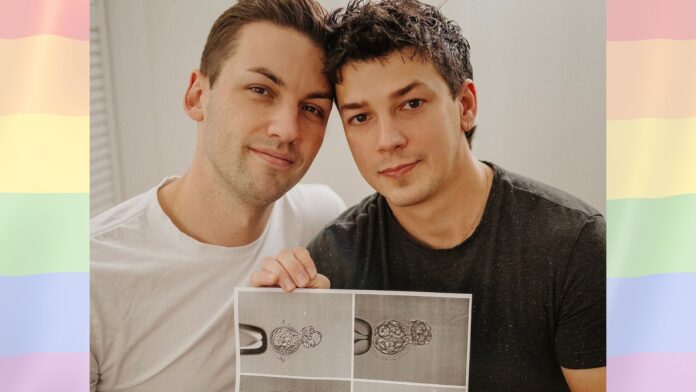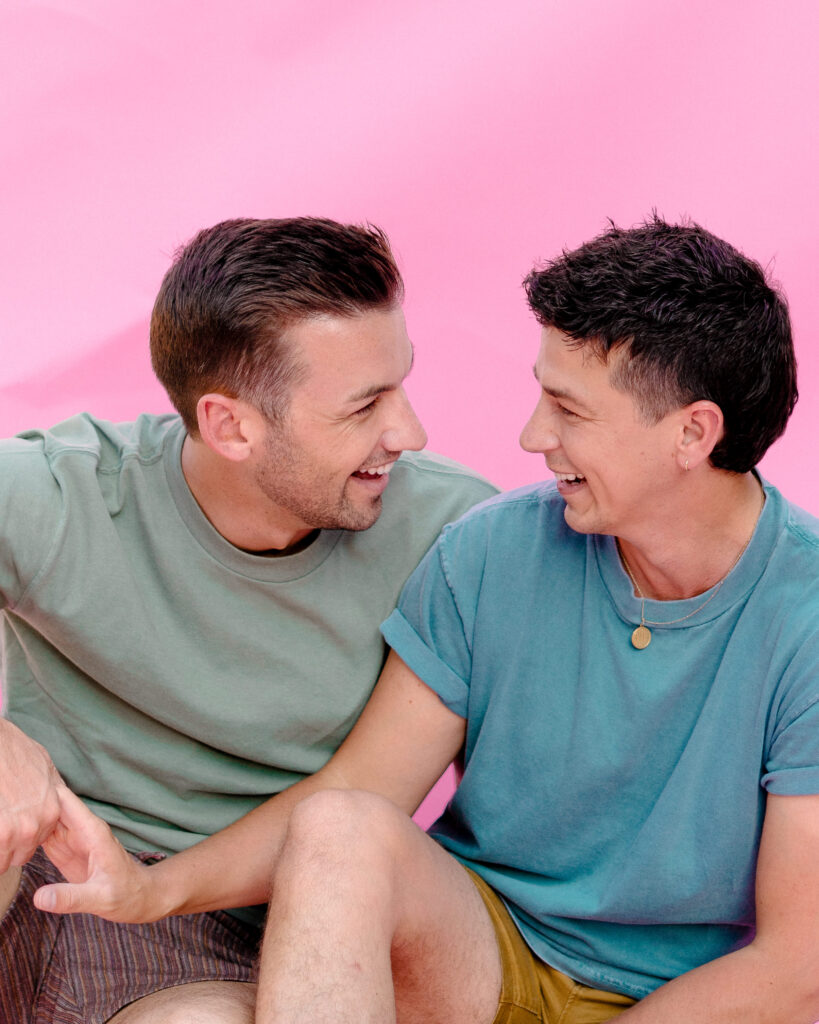
This is a guest commentary by Matthew Schueller for News is Out.
I feel extraordinarily lucky. As a kid, I never imagined my life could look like this. Growing up in the closet in the mid-Willamette Valley of Oregon, an area many consider to be the conservative Bible Belt of the Pacific Northwest, I didn’t think it was possible for me to find love, let alone get married. It’s humbling to see now that I’ve proved myself wrong. It is truly contrary to what I thought my life would be like 10 years ago, so to be here now in the process of starting a family is absolutely ridiculous to me. It already feels like a miracle, so the fact that we can even attempt to bring life into this world as a gay couple blows my mind.
I’ve always wanted to have kids, but I didn’t start seriously considering the possibility of surrogacy until I met Michael and our relationship became more serious. As I learned more about it and started looking into it more, I realized that it was the best path for us at the time. We started looking for an egg donor and surrogate mother at the beginning of 2021 when we officially made the decision to start the process.
That being said, we know it’s still not that easy. While it’s been around for a while, surrogacy is still riddled with mystery, inaccessibility and unpredictability. What we quickly realized when we started to look at our options was that we didn’t know the first thing about starting a family as a queer couple, and neither did most of our friends and family! When we started researching online, we found a ton of different information (often conflicting) from a variety of sources. We didn’t even know where to start, so we began calling up IVF clinics and surrogacy agencies.
We spent months researching the process and figuring out what exactly this might look like for us, how much it would cost, and how we should mentally prepare. I think that’s what inspired us to start sharing. We saw a lot of couples online sharing their stories after the fact — after the babies had arrived and everything looked fantastic — but we didn’t see many couples sharing their stories as it was happening. To us, the process of surrogacy looked like a mysterious black curtain where most of the details were not quite clear.

Our goal is to share the process of having kids as a gay couple as it’s happening, the good and the difficult. We believe alternative paths to parenthood should be accessible to all queer couples, and we think that starts with shedding light on how these processes actually work. With knowledge, there’s power. And since many of us in the LGBTQ+ community don’t know the options available for family planning, we don’t know where to start to enact change.
Many paths to parenthood are largely considered to only be attainable by the extremely privileged and wealthy — but we know that gender, sexuality and income level should not determine whether or not someone can have a family, so why is that not considered true for queer couples? There are a lot of big questions that have come up, so my husband, Michael, actually encouraged me to start a podcast with him to interview individuals who’ve experienced alternative paths to parenthood and experts who can provide insight and education. Thus, the birth of the “Who’s Your Daddy?” podcast.
Over the last 19 months, we’ve found our egg donor, created embryos and actively sought our gestational carrier. While there have been many ups and downs, we are really excited for the next steps in hopefully finding our surrogate soon. The first difficult decision was trying to figure out where we would undergo the process. We interviewed quite a few surrogacy agencies and IVF clinics, and we connected well with a doctor in Texas. We just had a good feeling about it, so we went with our gut. At the time, we didn’t think much of where our egg donor or surrogate could be located: we thought it didn’t really matter if they were far away from us. We were under the impression that pursuing surrogacy in Texas might be significantly cheaper than on the West Coast, and perhaps lead to a quicker matching time since there are just way more people in the Dallas area than in the entire state of Oregon.
Our minds changed. As the clinic progressed through egg donation and embryo creation, we started to feel the distance weighing on us. We also began reflecting on how the state laws could impact us. Just over the last year, Texas has taken sweeping action against access to abortion. So what does that mean for all those in the state considering being a surrogate? If pregnancy complications were to occur, how difficult would it be for a surrogate to access the needed medical care? It’s unclear. It’s understandable that the change in state law could cause concern for many considering becoming a gestational carrier and therefore limit the pool of people willing to carry in the state.
Legal implications aside, we want to be there for the ultrasounds, doctor’s appointments and of course the childbirth. Being far away from where our surrogate lives makes that difficult. Now, we recommend those considering surrogacy to look into your local laws, determine how those might impact you and then consider the closest reputable IVF clinics in your area before searching far away.
Our embryos were created last December. While 30 eggs were harvested, only five embryos made it to viability. I’m the genetic half of four of the embryos, while Michael is the genetic half to one. It was a difficult experience. On one hand, we were incredibly happy that we were able to produce five viable embryos. On the other hand, we’re extremely nervous. Our goal starting out was to have twins, each of us the genetic father of one. With only having one embryo on Michael’s side, that means there’s just one chance at a transfer. If it were to fail, we’re just not sure it’s financially feasible to repeat the IVF process and try for more embryos. So, we’re hopeful. Optimism can be powerful here, so we look at this as having five embryos — five wonderful chances to have a baby. We might not end up with twins like we first sought to do, but if we’ve learned one thing from this entire journey, it’s that we cannot control what we cannot control. Surrogacy and IVF are seriously unpredictable processes, and we’re just hopeful to see what miracle biology will bring.
Matthew Schueller is a content creator and registered nurse. He hosts the “Who’s Your Daddy” podcast along with his husband, Dr. Michael Lindsay. You can follow @MichaelandMatt on Instagram, TikTok, and YouTube.

